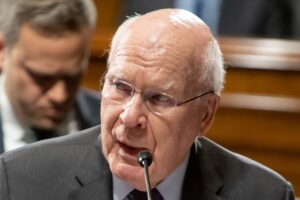Eight-term Vermont Sen. Patrick Leahy (D-Vt.), chair of the powerful Senate Appropriations Committee, announced Monday he will not seek reelection in 2022.
Leahy, who is the longest-serving member currently in the Senate and the chamber’s president pro tempore, now joins top Republican appropriator Sen. Richard Shelby (R-Ala.) in deciding to retire at the end of their term, creating an opening atop the Appropriations Committee in the next Congress.

“My approach on Appropriations was simple: help all states in alphabetical order. Starting with the letter V, Vermont,” Leahy said during remarks Monday morning from the Vermont State House in Montpelier. “So, yes, I am proud to be Vermont’s longest serving Senator. While I will continue to serve Vermont, [my wife] Marcelle and I have reached the conclusion that it is time to put down this gavel. It is time to pass the torch to the next Vermonter who will carry on this work for our great state. It’s time to come home.”
First elected to the Senate in 1974, Leahy previously served as ranking member on the Senate Appropriations Committee from 2017 to 2021 before taking over as the panel’s leader in the current Congress.
If Democrats are able to hold the Senate in the 2022 midterms, Sen. Patty Murray (D-Wash.) would be in line to lead the Appropriations panel based on seniority.
With Shelby retiring, Sen. Susan Collins (R-Maine) would be next in line to helm of the committee if Republicans are able to take control of the Senate.
Both Murray and Collins, like Leahy, also serve on the Senate Appropriations’ defense subcommittee.
Shelby, who is also the top Republican on the on Appropriations’ defense spending subcommittee, announced his plan to retire back in February (Defense Daily, Feb. 8).
Rep. Peter Welch (D-Vt.), Vermont’s sole member in the House, is considered a likely candidate to run for Leahy’s seat.
Leahy and Senate Democrats recently rolled out their $726 billion fiscal year 2022 defense appropriations bill, which drew a quick rebuke from GOP lawmakers over the five percent increase in military spending relative to the 13 percent boost in non-defense spending across other bills (Defense Daily, Oct. 18).